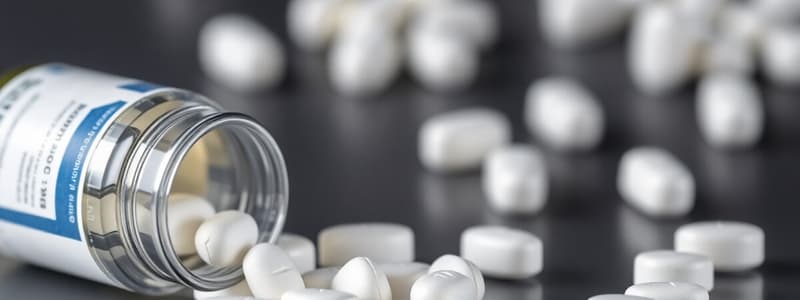Podcast
Questions and Answers
What is the most important property of an ideal drug?
What is the most important property of an ideal drug?
- Chemical Stability
- Selectivity
- Effectiveness (correct)
- Safety
A safe drug cannot produce harmful effects even if administered in very high doses.
A safe drug cannot produce harmful effects even if administered in very high doses.
True (A)
What is a selective drug?
What is a selective drug?
A drug that elicits only the response for which it is given.
An ideal drug should have ________ action, meaning drug effects are reversible.
An ideal drug should have ________ action, meaning drug effects are reversible.
What does predictability refer to in pharmacology?
What does predictability refer to in pharmacology?
Which of the following is NOT considered an additional property of an ideal drug?
Which of the following is NOT considered an additional property of an ideal drug?
What is the definition of pharmacotherapy?
What is the definition of pharmacotherapy?
The study of the biological effects of chemicals is known as ________.
The study of the biological effects of chemicals is known as ________.
Flashcards are hidden until you start studying
Study Notes
Properties of an Ideal Drug
- Effectiveness: A drug must elicit the desired therapeutic response for which it is prescribed, making effectiveness the most crucial property.
- Safety: An ideal drug should not produce harmful effects, even at high doses and prolonged usage.
- Selectivity: A drug should specifically produce the intended effect without eliciting unwanted responses.
Introduction to Pharmacology
- Pharmacology is the study of how chemicals affect living organisms and their biological effects.
- Drugs are chemicals introduced into the body to induce changes in physiological functions.
Pharmacotherapeutics/Clinical Pharmacology
- This branch of pharmacology focuses on using drugs to treat, prevent, and diagnose diseases.
- Key concerns include:
- The effects of drugs on the body
- The body's response to drugs
Additional Properties of an Ideal Drug
- Reversible Action: Drug effects should be reversible, allowing for a return to pre-treatment conditions within a suitable timeframe.
- Predictability: An ideal drug should have predictable effects, allowing healthcare providers to anticipate patient responses.
- Ease of Administration: The drug should be simple to administer, with convenient routes and minimal daily doses.
- Freedom from Drug Interactions: A drug should not adversely interact with other medications, which can alter therapeutic outcomes.
- Low Cost: An ideal drug should be affordable to ensure accessibility for patients.
- Chemical Stability: Drugs should maintain effectiveness during storage; some may degrade over time, while others remain stable.
Fundamental Terms
- Drug: A chemical that can affect living processes.
- Pharmacology: The study encompassing drug properties, interactions, absorption, distribution, metabolism, and excretion.
- Clinical Pharmacology: The study of drug effects in humans, including various patient populations.
- Therapeutics: The application of drugs for diagnosis, prevention, or treatment of diseases.
Studying That Suits You
Use AI to generate personalized quizzes and flashcards to suit your learning preferences.




